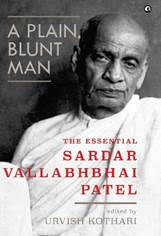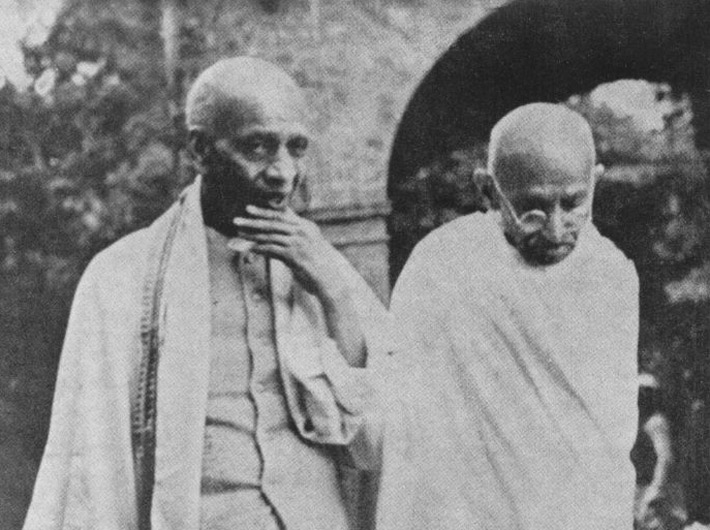An excerpt from a short biographical sketch from ‘A Plain, Blunt Man: The Essential Sardar Vallabhbhai Patel’
A Plain, Blunt Man: The Essential Sardar Vallabhbhai Patel
Edited by Urvish Kothari
Aleph, 328 pages, Rs 799

Sardar Vallabhbhai Patel was one of India’s most prominent founding fathers. A lifelong Gandhian and Congressman, he is remembered today for the major role he played in the country’s struggle for freedom, and during the tumultuous early years of the newly independent nation, the sagacity with which he dealt with the accession and integration of the princely states with the Indian union, the banning of the RSS after the assassination of Mahatma Gandhi, and the firmness with which he managed the breakdown of law and order after Partition. In the years after his death in 1950, his stature has only grown and many parties have tried to co-opt him to serve their political ends.
A man of unimpeachable integrity and firm convictions, Sardar Patel never shied away from stating his views on any issue no matter how contentious. This anthology brings together his key writing and thinking on a variety of subjects including the accession of princely kingdoms, Indian secularism, the need to protect the interests of minorities, his differences with Nehru, his reverence for Gandhi, his distaste for sectarian politics, his belief in the idea of a plural India, and much else besides.
The editor, Urvish Kothari, is a well-known Gujarati journalist, researcher and satirist with a keen interest in Gandhi, Patel, Ambedkar, Nehru, and the freedom movement of India. He did his PhD on the Hindu–Muslim relationship in Gandhi’s articles in the periodical ‘Navjivan’. He has written books in Gujarati on various subjects including one on Sardar Patel.
Here is an excerpt from a short biography of Sardar at the beginning of the book:
Sardar
Newly independent India found herself engulfed in the worst kind of communal violence. Gandhi had buried himself in the efforts to douse the communal fire. As home minister, Patel was accused of being anti-Muslim. In some cases, even Gandhi sought clarifications. But he thought of Patel as a large hearted leader who would be accommodative of all Indians. Many of Patel’s words at that time, if quoted out of the context and without considering the political situation, could be used to portray him as a communal Hindu leader. But such generalizations would be a gross simplification of the facts, as is evident from some of his correspondences present in this volume.
Though Hindu–Muslim unity was not an article of faith for Patel, he was not anti-Muslim or an ideologue of the Hindu Rashtra. He was driven principally by administrative concerns and had a no-nonsense approach. He would not go the extra mile to win the trust of the Muslims. He wanted Muslims of India to distance themselves from the politics of the League that had resulted in the partition of the country. He would not tolerate the sentiment of ‘Hanske liya hai Pakistan, ladke lenge Hindustan’ (‘We attained Pakistan with ease, we shall win Hindustan by force’). He could be bitter and hurtful in his speeches, and yet he did not hesitate to order actions against Hindu rioters.
There are several incidences when Patel spared no efforts to secure the safe passage of the Muslims. One of his famous speeches at Amritsar ensured the safety of Muslims from enraged Sikhs targeting Muslims migrating from West Punjab. Patel never claimed to be the protector of the Hindus or someone who taught Muslims a lesson. He did not pay heed to nasty anti-Muslim rumours and encouraged his colleagues to do the same. Establishing safety and peace in the wake of unprecedented communal violence was of utmost concern for him.
His conduct as the minister for Information and Broadcasting was considered high-handed by many. He was, for example, not amused by the constant, criticism of the newly formed government by Congress critic Acharya Kripalani, who wrote for the weekly magazine Vigil. Mainstream newspapers would reproduce his articles verbatim; Patel instructed those papers not to spread Kripalani’s pieces any further. He thought the country needed constructive suggestions and not just criticism.* [Interview with veteran Gujarati writer-journalist Prakash N. Shah. In Urvish Kothari, Prakash N. Shah, Ahmedabad: Saarthak Prakashan, 2019, p. 42.]
Despite their diverse personalities, Nehru and Patel’s unique areas of political expertise complemented each other. India was fortunate to receive the former’s vision and the latter’s administration along with Gandhi’s idealism to start her journey as an independent nation. Gandhi had no direct role in the decisions of the government. But he was still the guru of Nehru and Patel. They were still answerable to him when it came to moral issues. Giving Pakistan its remaining balance of Rs 55 crore (Pakistan’s share of the assets of undivided India) was one such problem on which Nehru and Patel were on the same page.
In January 1948, Gandhi went on the last indefinite fast of his public life in order to extinguish the fires of communal violence. However, the political atmosphere was rife with rumours. Critics claimed that Gandhi’s fast was against Patel’s alleged communal policies apart form holding back the due amount of Pakistan.
Gandhi’s assassination after two weeks brought the most damning wave of criticism for Patel. As the home minister, he was held responsible for failing to protect Gandhi even after an unsuccessful attempt by the assassins a few days before the fateful day. Following Gandhi’s principle of non-violence, two of his sons sought clemency for the Hindu right-wing assassin Nathuram Godse. But Patel firmly declined.
The shock and burden of Gandhi’s assassination took a heavy toll on Patel’s health. He had a severe heart attack in March 1948. When he gained consciousness, his first words were, ‘I had to go with Bapu.’* [See Rajmohan Gandhi, Patel: A Life, p. 472.] Tears rolled down from the face of the man known for his steely resolve.
Patel banned the Rashtriya Swayamsewak Sangh after Gandhi’s assassination, only lifting the ban after six months with several conditions. Patel is often accused of being too lenient with the organization. There are authentic quotes to prove that contention. But it is only a part of the whole truth. Gandhi and Patel both believed that Hindus were more likely to flee than fight to protect themselves and their family when attacked. They thought RSS drills might inculcate discipline and courage in the community. Neither was sympathetic to the anti-Muslim ideology propagated by the RSS and Hindu Mahasabha. Patel did not encourage or condone anticipatory or proactive violence in the name of protecting Hindus and criticized Hindu extremist newspapers without hesitation.
Patel was critical of the idea of a Hindu Rashtra and summarily dismissed it. He believed that when the country had begun her journey in a fresh direction, everyone should be given a new chance to move forward. He suggested members of the RSS join Congress in the same spirit. It might appear ironic that Nehru, not known for his sound judgment of people, thought of RSS as an organization with fascist tendencies, whereas Patel, known for his sharp judgment, thought of RSS as one of our own, warts and all. His correspondence with RSS chief M. S. Golwalkar reflected this sentiment.
And yet, he would neither tolerate systemic instigation against Muslims nor would he be eager to consider Muslims as second-class citizens.
[The excerpt reproduced with the permission of the publishers.]
